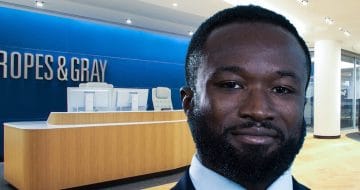Ropes & Gray’s Micheal Onyekuru reflects on his journey into law, from studying at Warwick to starting his training contract in the City

There wasn’t a single “lightbulb moment” that set Micheal Onyekuru on the path to a legal career. Instead, it was a gradual confirmation at every stage. “It wasn’t like one big ‘Eureka, I’m going to be a lawyer!’” he laughs. “But every step, from sixth form to my undergrad, to the SQE, to now working, I’ve kept enjoying it. And that’s what’s mattered most.” At no point did he doubt he was on the right path.
His interest in law began early. “I was always really into the humanities, debating and politics,” he recalls. “Law seemed like a good intersection of all those things.” That curiosity led him to study law at Warwick, attracted by its reputation and distinctive approach to teaching, which goes beyond black-letter law to examine how legal principles evolve in a wider context. “They didn’t just teach the rules,” he says. “They showed how the law changes and interacts with the modern world. That made it much more engaging.”
When it came to vacation scheme applications, Ropes & Gray stood out for more than its global prestige. “Of course, the quality of training and the firm’s reputation were huge draws,” he says. “But what really impressed me was how focused they are on personal development. You’re not just learning to be a good lawyer, you’re also developing as a person through things like business development masterclasses, inviting motivational speakers and personal coaches, and development workshops.”
Importantly, the culture at Ropes & Gray defied the stereotypes he had heard about US law firms. “The work is demanding, as you’d expect,” he says, “but the culture here is incredibly collegiate, open-door and genuinely welcoming.” Unlike some of the stories that circulate about certain American firms, Ropes offered an environment where he could thrive.
After impressing on the firm’s vacation scheme, Onyekuru secured a training contract. “That was a great feeling,” he smiles. “It really validated all the perseverance that went into getting there.”
He credits part of his journey to initiatives such as SEO London and Rare Recruitment, which support aspiring lawyers from underrepresented backgrounds. Through SEO, he attended an open day at Ropes & Gray, taking part in negotiation exercises with the firm. These schemes, he explains, offered invaluable exposure, from CV reviews and interview prep to building confidence in high-stakes settings. “They helped open doors,” he says, “but they’re not golden tickets. They don’t guarantee anything, they just put you in a position to show how good you are. And that’s all you need: the opportunity to be seen.”
His advice to students is to take advantage of such programmes if they are eligible. “They give you access to firms you might not otherwise get,” he says. “And the networking benefits last well beyond the events themselves. Even now, I keep in touch with people I met through SEO. It’s great having that support network in the legal industry.”
After graduating, Onyekuru faced one of the toughest hurdles on the path to qualification: the Solicitors Qualifying Examination (SQE). He completed his prep course with BPP University and doesn’t sugar-coat the experience. “The SQE is very difficult,” he says frankly. “It’s a long-term exam, and for about six to nine months it becomes your main focus. You really have to shift your priorities.”
His key to success is to treat it like a marathon, not a sprint. “You’re better off doing a few hours consistently each week and building up gradually, rather than cramming in the last month,” he advises. “Start steady in September and increase bit by bit. That’s how it sticks.”
Avoiding burnout, he adds, is equally important. “It’s easy to let studying take over, but it doesn’t have to be your whole life,” he says. “You need outlets that help you de-stress, like seeing friends, reading, walking or going to the gym.” For Onyekuru, swimming became his daily reset. “I’d study in the morning, go for a swim, come back, study again, then hit the gym in the evening. It broke up the day and kept my stress levels down.”
The lesson, he says, is about balance. “You can sit at your desk for ten hours and not achieve much, or you can do two or three focused hours that really count.”
Now a few months into his training contract, Onyekuru is in his first seat in asset management and private investment funds, an area he describes as challenging, dynamic and rewarding.
“I’m really enjoying it,” he says. “The learning curve is steep, which is actually a good thing because you can feel yourself developing. When I look back to my first day, there were so many terms I didn’t understand. Now they’re part of my everyday work.”
That steep learning curve, he adds, is part of the fun. “You start to see how everything you’ve studied connects to real work,” he explains. “It’s exciting to watch your understanding grow week by week.”
Looking ahead, he’s keeping an open mind about his future seats. “Being in asset management has given me a great view of how funds operate, so private equity and finance are definitely areas I’d like to explore,” he says. “But I also want to see more advisory work, maybe antitrust or litigation. I want to get a holistic sense of everything Ropes does before thinking about qualification.”
When asked what helped him stand out in interviews, Onyekuru points to commercial awareness and, crucially, knowing how to apply it. “Interviewers don’t just want you to repeat a headline,” he explains. “They want analysis. They want to see that you understand how a story affects wider market trends, and how those trends might impact the firm or its clients five or ten years down the line.”
As for building that awareness, he recommends The Economist, the Financial Times, City A.M. and the business sections of general news outlets. “The key is consistency. If you read regularly, you start to understand the business world better and notice patterns.”
Reflecting on his journey so far, Onyekuru says two words sum up his approach: passion and perseverance. “The road to a training contract isn’t easy,” he says. “Rejection is part and parcel of the process. You’ll get many more rejections than offers, but all you need is one yes.”
His advice for those facing setbacks is to treat each rejection as a redirection, an opportunity to learn rather than a verdict on your potential. “Keep your passion for the law alive, stay resilient and believe in yourself,” he says. “Have faith that you are good enough and you’ll get to where you want to be. All you need is that one yes.”
Micheal Onyekuru will be speaking at THIS AFTERNOON’s in-person event, ‘Black lawyers share their stories — with Ropes & Gray’. Secure one of the final few spots.
View this post on Instagram
About Legal Cheek Careers posts.


